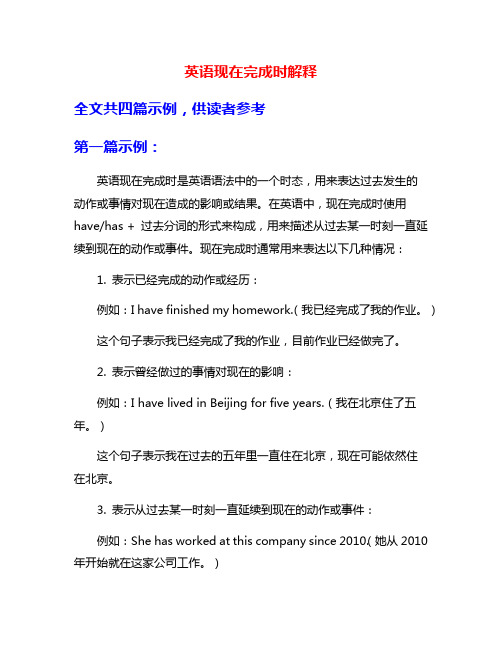英语现在完成时讲解
现在完成时的用法和意义

现在完成时的用法和意义现在完成时是英语中的一种时态,用来表示过去发生的与现在有关的动作或状态。
在句子中,现在完成时通常由"have/has + 过去分词"构成,其中have用于第一人称和第二人称,has用于第三人称单数。
现在完成时主要有以下几种用法和意义。
1. 表示过去的动作对现在造成的影响:现在完成时可以突出过去发生的动作对现在产生的影响。
例如:- I have studied English for five years. (我学习英语已经五年了)这句话表示过去五年来一直学习英语,目前我对英语有一定的掌握程度。
2. 表示过去发生的动作对现在的结果或状态:现在完成时经常用来说明过去发生的动作对现在产生的影响或导致的结果。
例如:- She has broken her leg. (她摔断了腿)这句话说明她过去摔断了腿,现在的结果是她无法行走。
3. 表示过去的经历或经验:现在完成时也可用来表达过去的经历或经验,强调对现在的影响。
例如:- I have been to Paris twice. (我去过巴黎两次)这句话表示我过去两次去过巴黎,体验了巴黎的文化和风景。
4. 表示一个在过去开始而一直延续到现在的动作:现在完成时可以表达从过去某一时间点开始一直延续到现在的动作。
例如:- I have lived in this city since 2008. (我从2008年开始就一直住在这个城市)这句话表示我从2008年开始就一直生活在这个城市。
5. 表示刚刚完成的动作:现在完成时也可以表示刚刚完成的动作,这种用法通常与表示刚发生的时间状语连用。
例如:- She has just arrived at the airport. (她刚刚到达机场)这句话表示她刚刚到达机场,强调动作的新鲜性。
6. 表示重复或连续发生的动作:现在完成时还可以表示在过去发生的一系列重复或连续的动作,与表示频率的副词连用。
英语现在完成时语法讲解

英语现在完成时语法讲解英语现在完成时(Present Perfect Tense)是用来表达过去发生的动作或状态与现在的关系的一种时态。
它由“have/has + 过去分词”构成。
现在完成时常用于以下几种情况:1. 表示过去发生的动作对现在造成的影响或结果。
例如:I have lost my key.(我把钥匙弄丢了。
)这里的“have lost”表示过去发生的动作,但是现在没有钥匙导致现在的结果是找不到钥匙。
2. 表示过去发生的动作在现在仍然持续或重复。
例如:He has lived in London for five years.(他在伦敦住了五年了。
)这里的“has lived”表示过去开始的动作,但是他至今仍然住在伦敦。
3. 表示过去发生的动作在现在刚刚完成。
例如:She has just finished her homework.(她刚刚完成了她的作业。
)这里的“has just finished”表示刚刚完成的动作。
4. 表示过去发生的动作在现在的时间段内发生多次。
例如:I have visited Paris many times.(我去过巴黎很多次。
)这里的“have visited”表示过去的多次动作在现在的时间段内持续进行。
需要注意的是,现在完成时与具体的过去时间点无关,而与现在的状态或结果相关。
此外,现在完成时也可以与一些时间状语连用,如just(刚刚)、already(已经)、yet(还)等,以更准确地表示动作发生的时间。
下面是一些现在完成时的例句:- I have finished my work.(我完成了我的工作。
)- Have you ever been to China?(你去过中国吗?)- She has already eaten dinner.(她已经吃过晚饭了。
)- We haven"t seen each other for a long time.(我们很久没有见面了。
现在完成时的用法详解英语

• Is your father in ?
•
No, heha__s_g__o_n__e__t_o___ to Shenzhen.
•
H__a__s___he everb_e_e__n__ there before ?
•
Yes, heh_a_s__b_e__e_n_____ there several times
ago.
A. Did…copy…did
B. Have…copied…have
C. Have…copied…did D. Did …copy…had
5. “Why _A_____ she _______ angry ?”
“Because he _____ at her just now .”
A. did…get…shouted B. has…got…shouted
A. Have…gone to B. Have…gone in
C. Have…been to D. Have …been in
3. My brother _C___college for over three years.
A. has gone to B. has been to C. has been at
但是不能和表示一段时间的状语连用。
短暂性动词变延续性动词:
• join --- be in / a
2) comeb-e-- in / at
• 3) borrow ---keep 4) buy -h-a-ve
5) arrive ---be
6) leave b--e- away (from)
7) begin --b- e on
• It has been colds_in__c_e__ two weeks ago.
英语现在完成时解释

英语现在完成时解释全文共四篇示例,供读者参考第一篇示例:英语现在完成时是英语语法中的一个时态,用来表达过去发生的动作或事情对现在造成的影响或结果。
在英语中,现在完成时使用have/has + 过去分词的形式来构成,用来描述从过去某一时刻一直延续到现在的动作或事件。
现在完成时通常用来表达以下几种情况:1. 表示已经完成的动作或经历:例如:I have finished my homework.(我已经完成了我的作业。
)这个句子表示我已经完成了我的作业,目前作业已经做完了。
2. 表示曾经做过的事情对现在的影响:例如:I have lived in Beijing for five years.(我在北京住了五年。
)这个句子表示我在过去的五年里一直住在北京,现在可能依然住在北京。
3. 表示从过去某一时刻一直延续到现在的动作或事件:例如:She has worked at this company since 2010.(她从2010年开始就在这家公司工作。
)这个句子表示她从2010年开始一直在这家公司工作,目前仍在这家公司工作。
需要注意的是,现在完成时常常与表示一段时间的状语连用,如for,since等,用来表明动作或事件发生的时间跨度。
现在完成时通常不能与一些表示具体时间的状语连用,如yesterday,last week等。
如果要表达具体时间的动作或事件,应该使用一般过去时。
现在完成时在英语语法中扮演着重要的角色,帮助我们表达过去与现在的关系,强调过去的经历对现在的影响。
通过掌握现在完成时的用法和结构,我们可以更准确地描述和理解英语中的动作或事件。
第二篇示例:英语现在完成时是英语语法中的一个时态,表示过去发生的动作或情况对现在产生的影响或结果。
它通常由have/has + 过去分词构成。
例如:"I have visited Paris."(我去过巴黎)。
英语现在完成时与一般过去时的区别在于,一般过去时强调过去某个具体的时间点或时间段内发生的动作或事件,而现在完成时则强调过去发生的动作或事件对现在的影响或结果。
英语现在完成时态讲解

英语现在完成时态讲解-CAL-FENGHAI.-(YICAI)-Company One1现在完成时一、定义:表示一个动作在过去发生并对现在产生影响表示一个动作由过去发生持续到现在有可能停下,也有可能延续下去表示一个动作从过去开始发生到目前为止已经发生多次。
二、构成:现在完成时是由“助动词have / has + 动词的过去分词”构成的,其规则动词的过去分词构成与过去式相同,不规则动词的过去分词则需加强记忆。
如:I have just cleaned my clothes.我刚洗过衣服。
My brother has done his homework already. 我的弟弟已经做完他的作业了。
友情提示:在现在完成时的各种结构中,have, has均为助动词,无实际意义,只起构成时态的作用,不可省略。
当主语是第三人称单数时助动词用has,其余人称一律用have。
过去分词1 、规则动词:规则动词的过去分词的构成规则与规则动词的过去式的构成规则相同。
四点变化规则:(1)、一般动词,在词尾直接加“ ed ”。
work---worked---worked ,visit---visited---visited(2)、以“ e ”结尾的动词,只在词尾加“ d ”。
live---lived---lived ,(3)、以“辅音字母+ y ”结尾的动词,将 "y" 变为 "i" ,再加“ ed ”。
study---studied---studied ,cry---cried---cried ,play---played---played ,stay---stayed---stayed(4)、重读闭音节结尾,末尾只有一个辅音字母,先双写该辅音字母,再加“ ed ”。
stop---stopped---stopped , drop---dropped--dropped2 、不规则动词:AAA型原型过去式过去分词burst burst burst cast cast cast cost cost costcut cut cut hit hit hit hurt hurt hurtput put put set set set shut shut shutspread spread spread let let letAAB型beat beat beatenABA型become became become run ran run come came come特殊情况read read readread原形发音为/ri:d/,过去式和过去分词发音为/red/ABB型bring brought brought buy bought bought build built builtburn burnt burnt catch caught caught dig dug dugfeel felt felt fight fought foughtfind found foundlay laid laid lead led led lose lost lostmake made made meet met met sell sold soldABC型begin began begun blow blew blown break broke brokenchoose chose chosen draw drew drawn drive drove drivendrink drank drunk fly flew flown forgive forgave forgiven三、现在完成时的时间副词①用副词already和yet。
英语现在完成时解释

英语现在完成时解释英语现在完成时是一种时态,用来表达过去发生的动作或事件对现在产生的影响或者与现在仍然有关联。
它通常由助动词"have"或"has"加上动词的过去分词构成。
现在完成时常用于以下几种情况:1. 表示过去某个时间点开始发生的动作,一直延续到现在,或者其影响仍然存在。
例如,I have lived in this city for five years.(我在这个城市已经住了五年了。
)。
2. 表示过去发生的动作对现在产生的影响。
例如,She haslost her keys.(她丢了她的钥匙。
)。
3. 强调动作已经完成或者发生了多次。
例如,I have visited Paris three times.(我去过巴黎三次了。
)。
4. 表示在过去某个时间点之前已经发生的动作。
例如,They have already finished the project.(他们已经完成了这个项目。
)。
需要注意的是,现在完成时通常与表示时间段的状语连用,如for(表示持续的时间)和since(表示起始时间点)。
另外,现在完成时有时候也可以与表示未来的时间状语连用,表示对未来的期待或预测。
例如,By the time you arrive, I will havefinished the report.(等你到的时候,我会已经完成报告了。
)。
总之,现在完成时是英语中非常常用的一种时态,能够帮助我们清晰地表达过去、现在和未来之间的关系。
英语现在完成时讲解

英语现在完成时讲解英语中的现在完成时(present perfect tense)是用来描述过去发生的动作或情况与现在的关系的一种时态。
它通常用来强调过去发生的事情对现在产生的影响或结果。
在本文中,我们将详细讨论现在完成时的使用情况及其构成方式。
一、现在完成时的构成方式现在完成时的构成方式是由“助动词have/has + 动词的过去分词形式”组成。
具体使用有以下几种情况:1. 肯定句主语 + have/has + 过去分词 + 其他部分例如:- I have studied English for five years.(我已经学习英语五年了。
)- She has travelled to many countries.(她已经去过很多国家了。
)2. 否定句主语 + have/has + not + 过去分词 + 其他部分例如:- He hasn't finished his work yet.(他还没有完成工作。
)- We haven't seen each other for a long time.(我们已经很久没有见面了。
)3. 疑问句Have/Has + 主语 + 过去分词 + 其他部分?例如:- Have you ever visited Paris?(你曾经去过巴黎吗?)- Has she seen the latest movie?(她看过最新的电影吗?)二、现在完成时的使用情况现在完成时通常用于以下几种情况:1. 表示过去开始的动作一直延续至今或刚刚结束的情况。
例如:- I have lived in this city for ten years.(我在这个城市已经住了十年了。
)- They have worked on this project since last month.(他们从上个月开始就一直在做这个项目。
)2. 表示过去发生的动作对现在产生的影响或结果。
初中英语现在完成时讲解全(共24张PPT)

I studied English ten years ago.
(come来到某地….
left the team
has been on C.
表示动作发生在过去,对现在造成的影响。
)
be over
went to bed
填空使用for和since
Tom ___for several hours.
表示动作发生在过去,对现在造成的影响。
• She has lived here ______1996.
• 2 标准词:so far/up to now (到目前为止) ;lately/recently(最近)
• Up to now/So far ,I haven’t been successful.
• Lately/Recently,I haven’t seen my teacher.
3. He bought the motorbike a month ago.
---He ____ ____ the motorbike for a month. 4. He arrived here three days ago.
--- He ____ ____ here since three days ago. 5. They turned off the light 2 hours ago.
(finish结束....)
be over
1.我买这本书三年了。Buy I have bought the book.
(1) I have had the book for 3 years. (2) I have had the book since 3 years ago.
了borrow He has borrow the book. (1)He has kept the book for 2 months . (2) He has kept the book since 2 months ago.
- 1、下载文档前请自行甄别文档内容的完整性,平台不提供额外的编辑、内容补充、找答案等附加服务。
- 2、"仅部分预览"的文档,不可在线预览部分如存在完整性等问题,可反馈申请退款(可完整预览的文档不适用该条件!)。
- 3、如文档侵犯您的权益,请联系客服反馈,我们会尽快为您处理(人工客服工作时间:9:00-18:30)。
现在完成时
1.构成:
助动词(第一、第二人称单复数以及第三人称复数)have /(第三人称单数)has +过去分词”否定句形式:是在have/has后直接+not;疑问句形式:把have/has提前。
肯定回答:Y es,主语+have/has. 否定回答:No,主语+haven’t/hasn’t.
现在完成时用于描述一个发生在过去,并一直延续到现在,或者可能还要延续到将来的动作。
e.g. I called her just now. (过去时)/ I have just called her.(现在完成时)
They have worked in the factory for ten months by now.从句中得知:他们在工厂干活这个动作始于十个月前,这十个月来他们一直在工厂干活,换而言之,这个动作从过去一直延续到了现在。
e.g. We have learned English for nearly 3 years.学英语这个动作开始于3年前,三年来一直在学,也就是说学英语这个动作从三年前一直延续到现在。
2.常与现在完成时连用的时间状语有:
already , yet , never , ever , just , before , in the last/past 10 years , so far , since+点时间, for+段时间等等。
1) already , just用语肯定句中:
e.g. --Would you like to see the film?
--No, I’ve already seen it. / No, I have seen it already. / No, I have just seen it.
(言下之意:已知内容,无须再看。
)
2) yet用于有already的句子变成的否定句或者疑问句中,放在句尾。
e.g. I have already milked the cow. (我已经挤过牛奶了。
)
→ Have you milked the cow yet? –No, I haven’t done it yet. / No, not yet.
Have you had lunch yet?
3) never用于否定句或者否定回答中。
ever用于疑问句中表示“曾经……吗?”
e.g. I have never lost a library book before.
→ Have you ever lost a library book? –No, never.
4) before用于句末。
e.g. The woman has never heard of you before.
5) so far用于句首或句末。
e.g. So far, we have traveled to the moon.
6) in the past/last…years用于句末。
e.g. I have learned more than 2000 new words in the last/past 3 years.
7) for+一段时间(句中动词必须是延续性动词)
since+起点时间(句中动词必须是延续性动词)
since+一段时间+ago(句中动词必须是延续性动词)
e.g. I have taught English for 9 years (since 9 years ago).
He has read newspaper for 3 hours (since 3 hours ago).
He has been in his school since 1999.
I have known him since 20 years ago (for 20 years).
*since+从句(从句用过去时态)
e.g. I have lived here since I was born.
He has worked in this factory since he left college.
3.非延续性动词在现在完成时中的用法:
有些动词是瞬间动词(也叫非延续性动词),这些动词的动作是一发生就结束了,这些动作可用于现在完成时,但是不能跟表示一段时间的状语连用,例如:for … / since … / so far / up till now / up to now / in the past/last …years 等等。
e.g. He has become a doctor. → He has been a doctor for 5 years.
His grandfather has died . → His grandfather has been dead for 10 years.
Wu Peng has joined the League. → Wu Peng has been a league member for 3 years.
The film has finished . → The film has been over for 1 hour. The film has begun . → The film has been on since 1 hour ago.
has left home. → Tom has been away from home for 3 weeks(since 3 weeks ago).
opened 3 years ago. → The factor has been open for 3 years.(过去式和现在完成时的互换)
综述:短暂性动词若要与表示一段时间的状语连用构成现在完成时have/has been+形
He has gone to Beijing.(他已经去北京了。
)→ He has been in Beijing for 3 days.
He has been to Beijing.(他去过北京了。
) (误)→(正)
Great changes have taken place in my hometown in the past/last 5 years.
This is the most beautiful mountain I have ever seen .
最高级 + 现在完成时。
